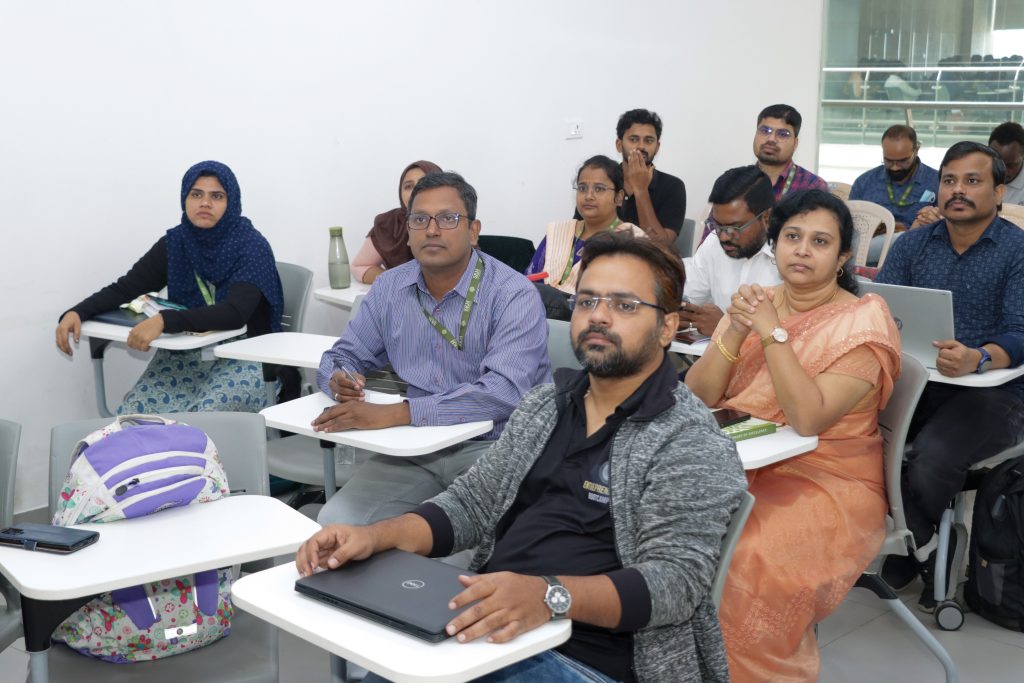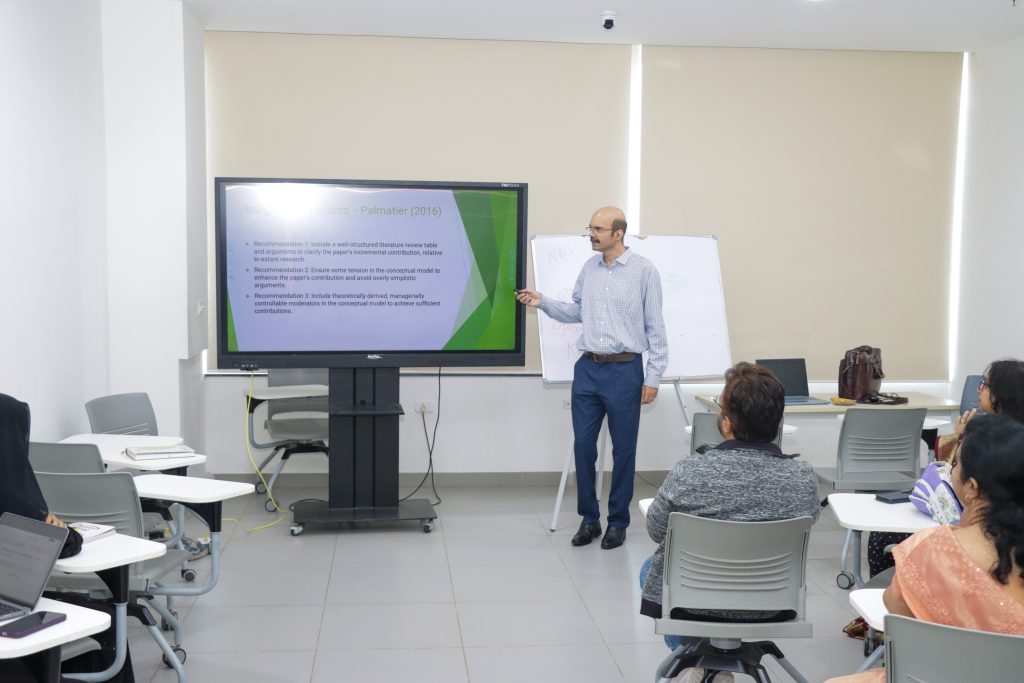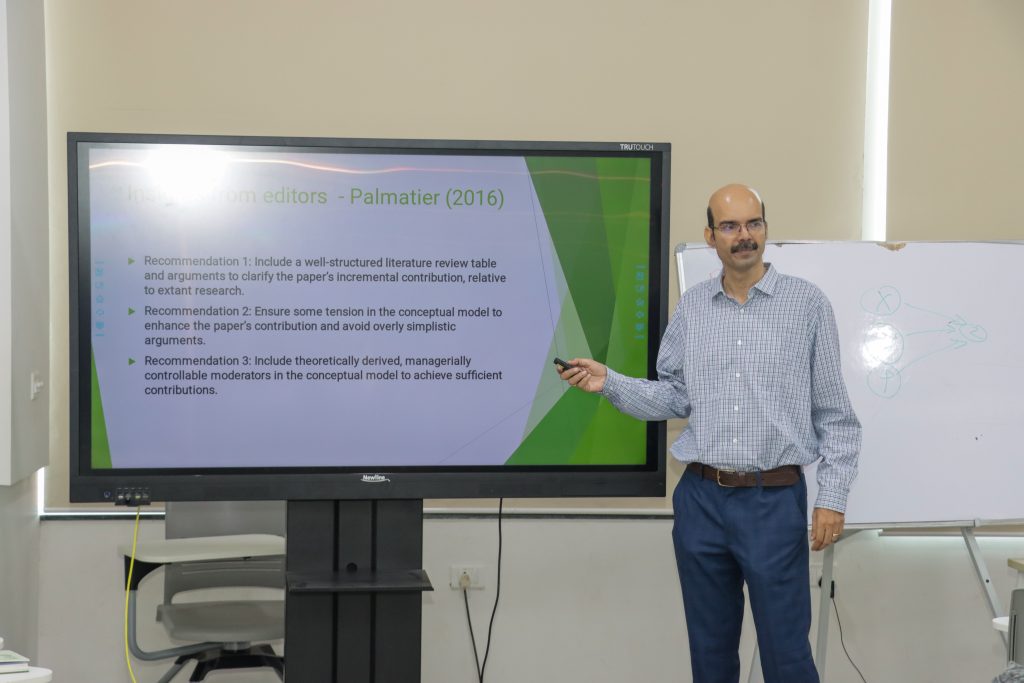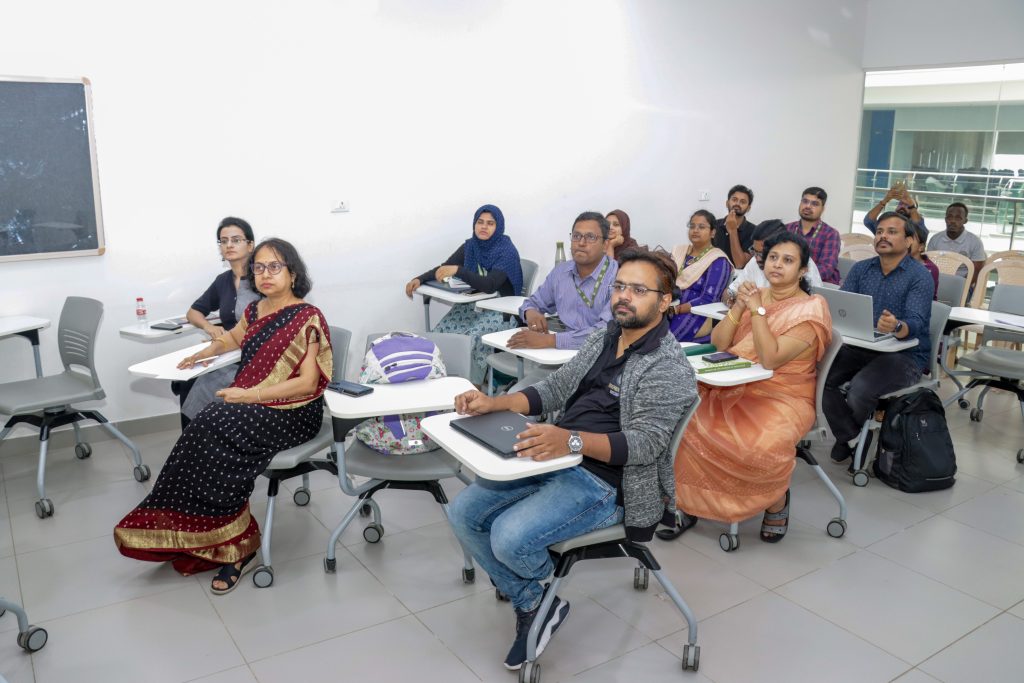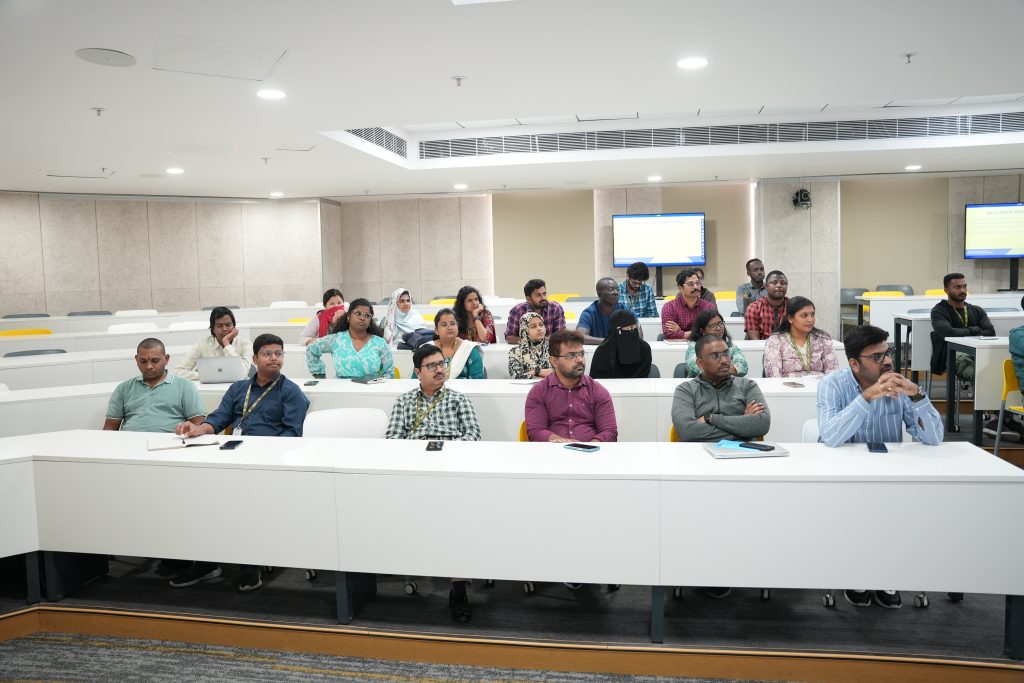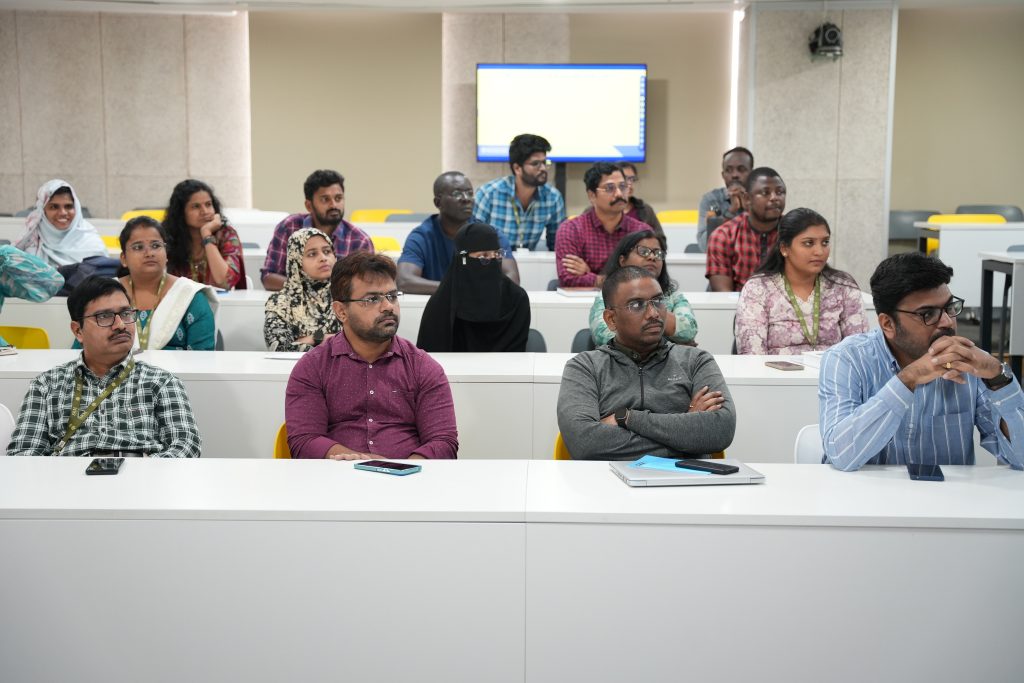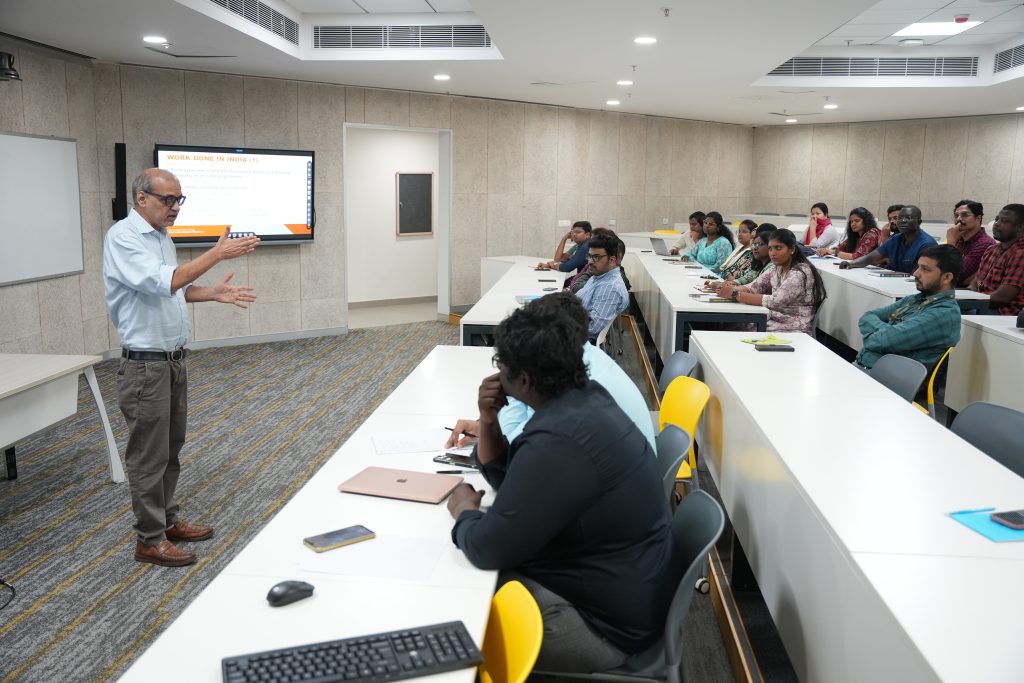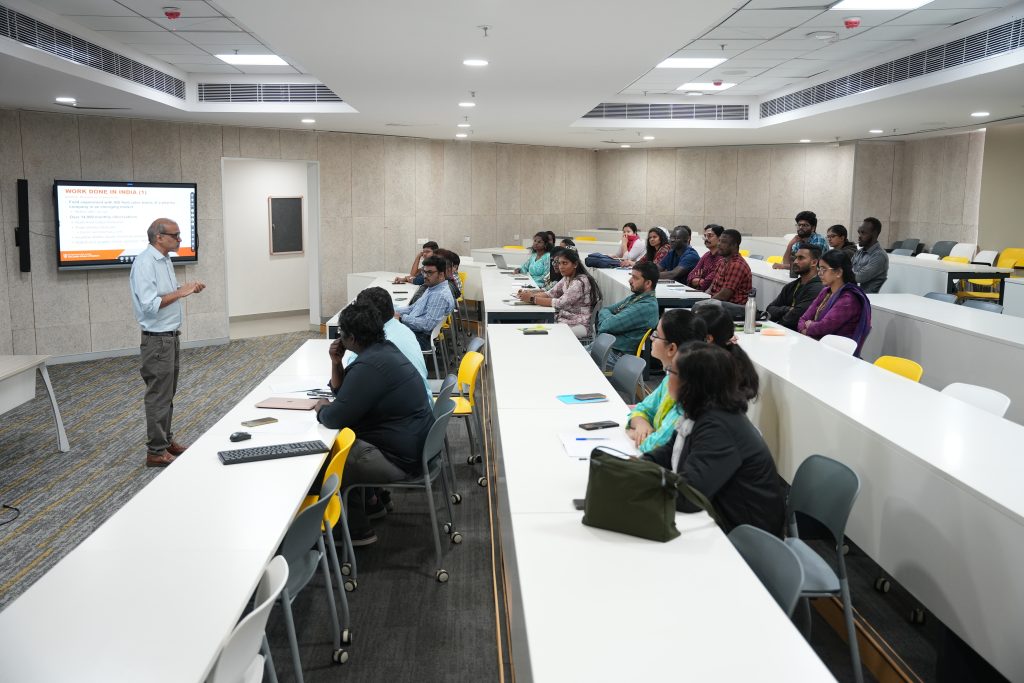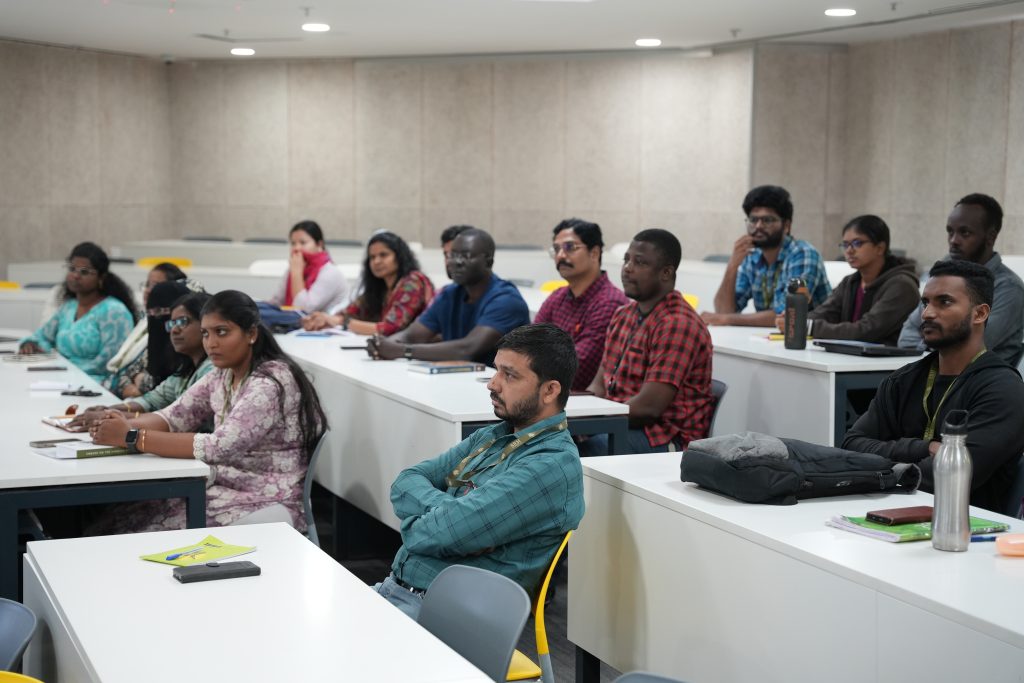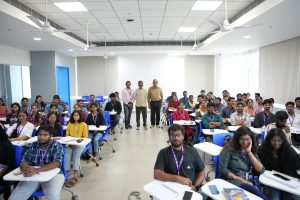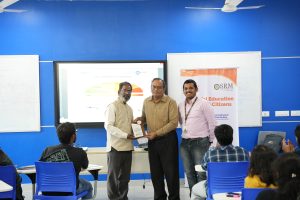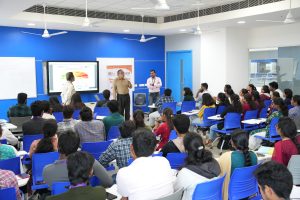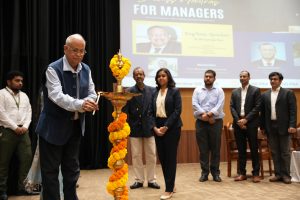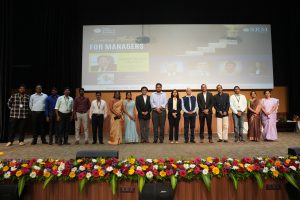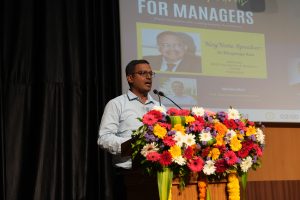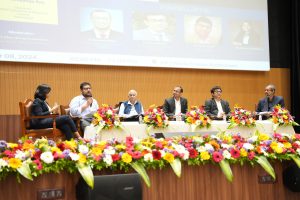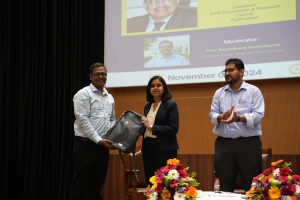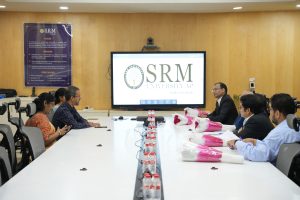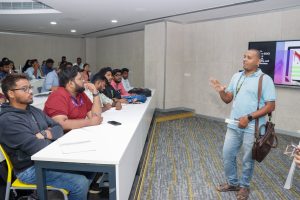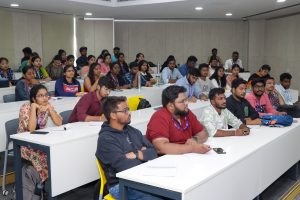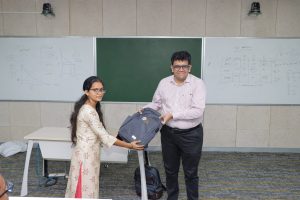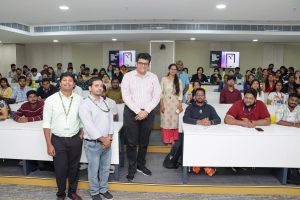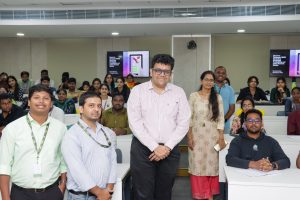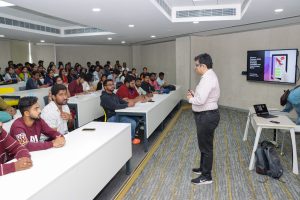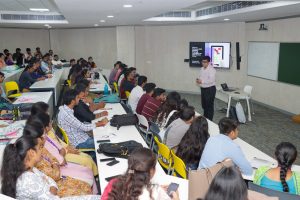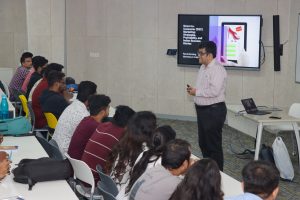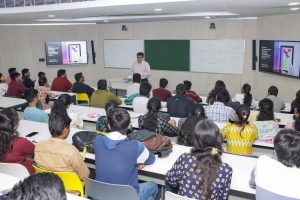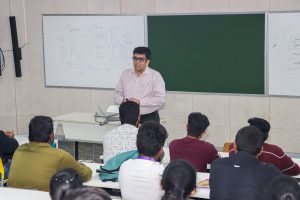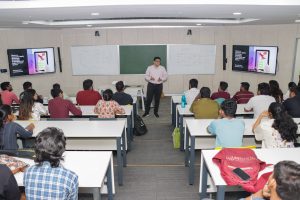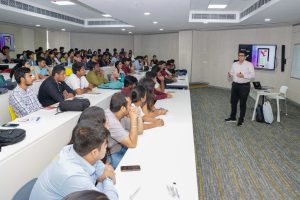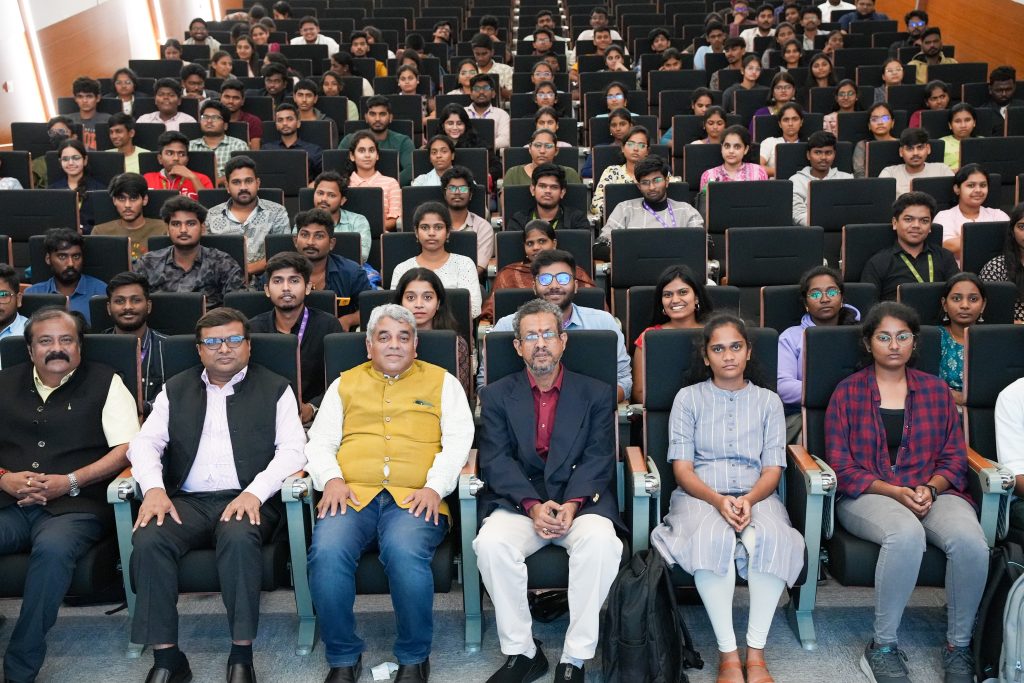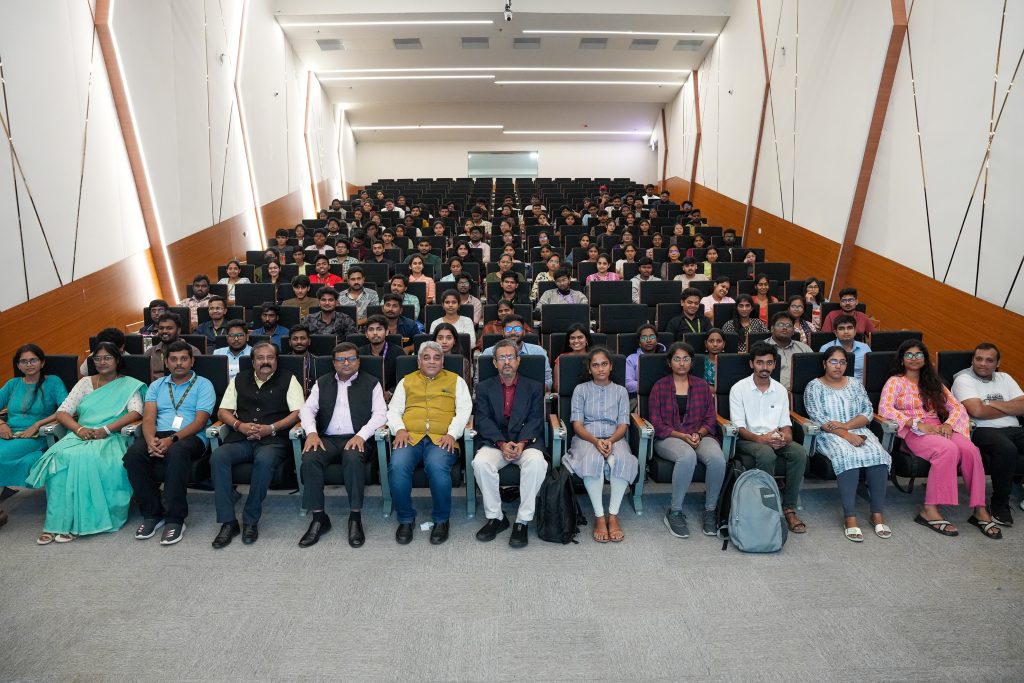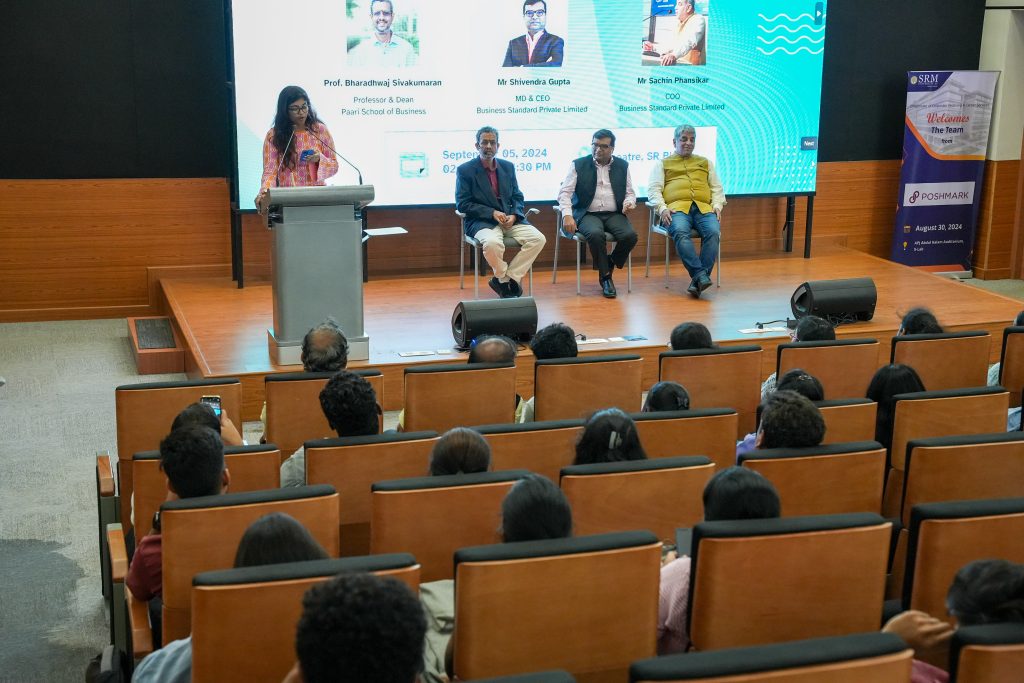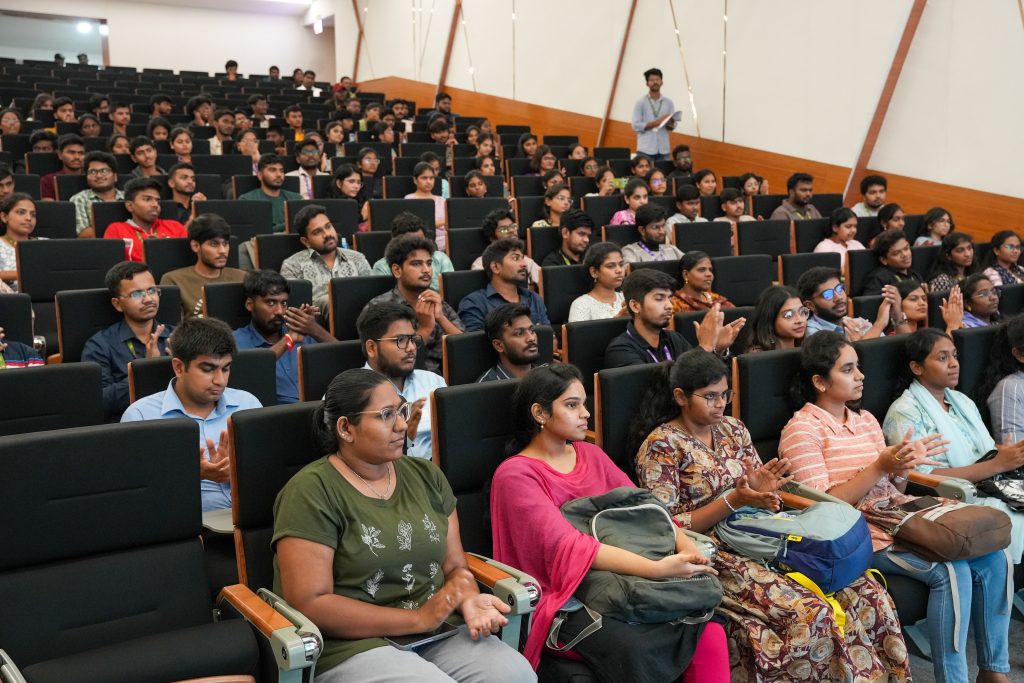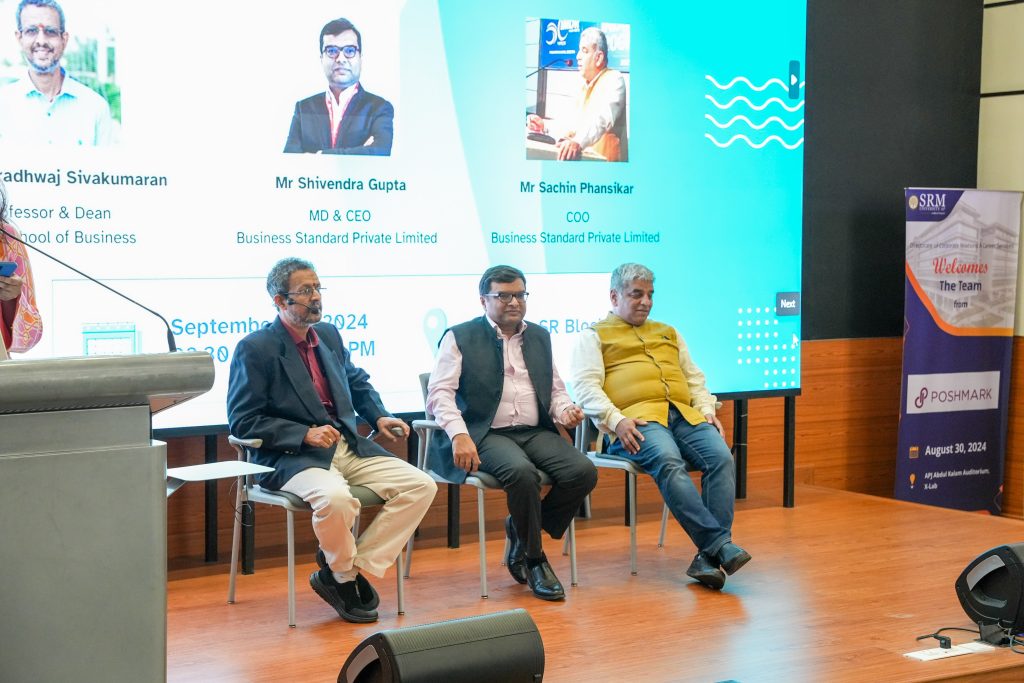Enabling Research Excellence: Paari School of Business organises Five-Day FDP
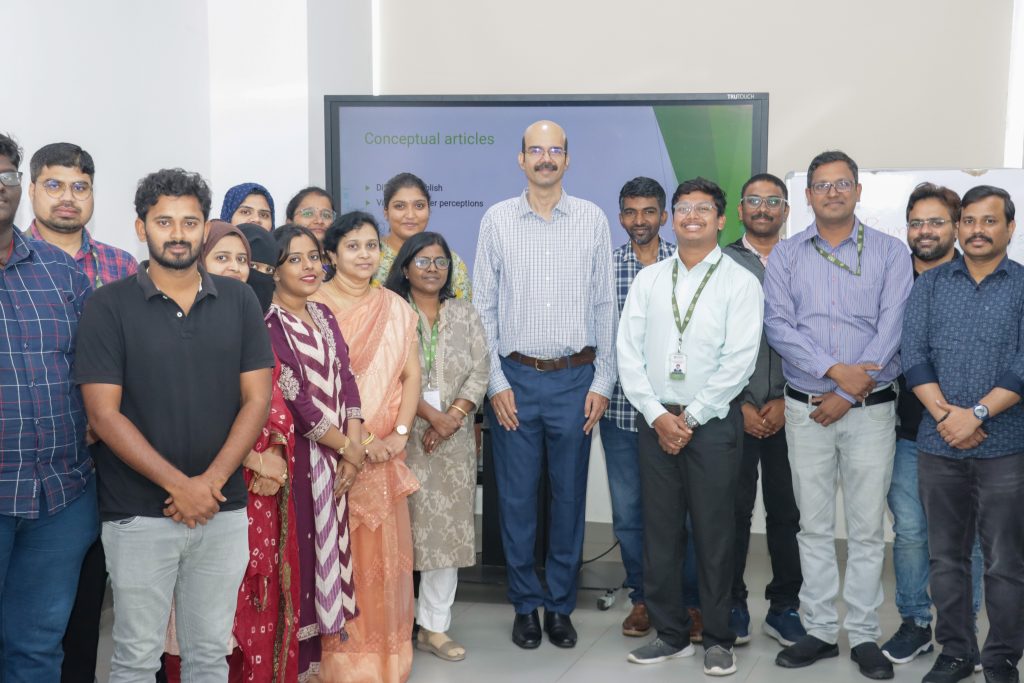 Research is essential for academics in today’s dynamic environment and SRMAP sincerely believes in the idea that research is the foundation to innovation and progress. The Department of Management at Paari School of Business organised a 5-day International Faculty Development Programme (FDP) in hybrid mode, focusing on the “Art of Writing High-Quality Research Articles in Management.” Resource persons, Prof. Piyush Sharma, Prof. Tak Yan Leung, Dr Kishore Gopalakrishna Pillai, and Dr Vimal Babu, provided participants with valuable insights into advanced research methodologies and effective academic writing strategies.
Research is essential for academics in today’s dynamic environment and SRMAP sincerely believes in the idea that research is the foundation to innovation and progress. The Department of Management at Paari School of Business organised a 5-day International Faculty Development Programme (FDP) in hybrid mode, focusing on the “Art of Writing High-Quality Research Articles in Management.” Resource persons, Prof. Piyush Sharma, Prof. Tak Yan Leung, Dr Kishore Gopalakrishna Pillai, and Dr Vimal Babu, provided participants with valuable insights into advanced research methodologies and effective academic writing strategies.
The FDP aimed to deliver a comprehensive understanding of the essential components of academic research and publication, equipping attendees with the skills required to craft well-structured, high-impact research articles. The topics discussed during the five-day programme were particularly relevant and contemporary. Moreover, the resource persons encouraged the participants to enhance their research output, improve the likelihood of the participant’s publication in reputable journals, and contribute meaningfully to the academic community. The FDP sought to bridge the gap between research conceptualisation and publication, enabling faculty members to become more proficient and impactful researchers.
Participants greatly benefitted from the combined expertise and experience of these distinguished scholars, fostering a deeper understanding of high-quality research practices.
- Published in Departmental News, News, Paari Current Happenings
Women in Leadership: Two-Day ICSSR-sponsored Conference Come to a Successful End
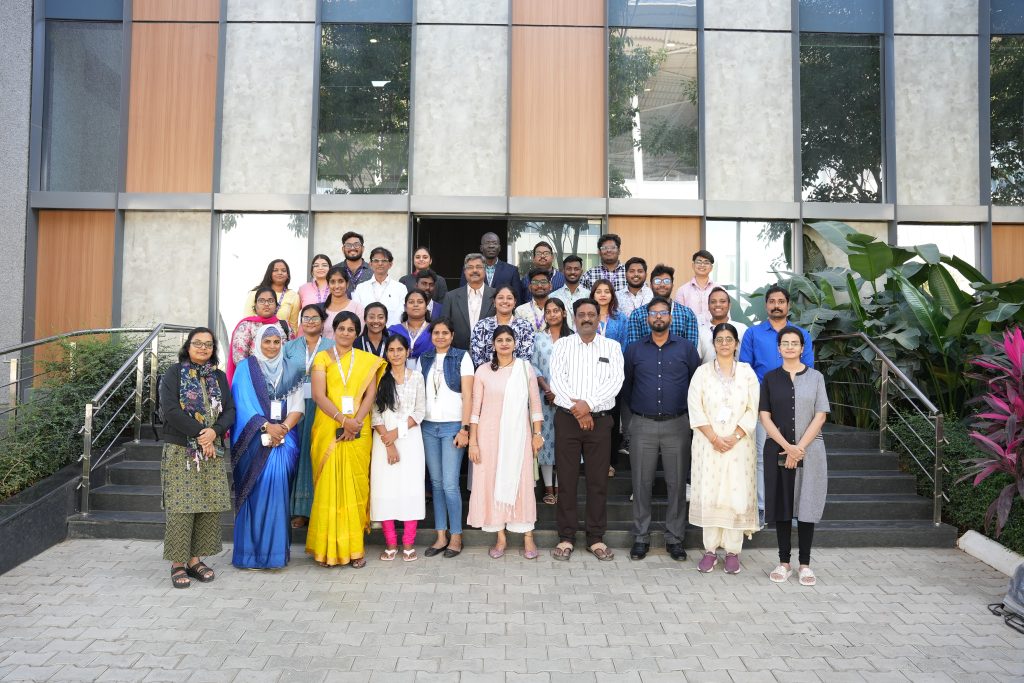
The Paari School of Business hosted its Two-Day ICSSR-sponsored National Conference on the theme “Women in Higher Educational Institutions (HEIs) and Career Progression” as part of the Vision Viksit Bharat@2047 initiative on January 23 – 24, 2025. This event brought together academics, delegates, and leaders to discuss research findings and actionable solutions for advancing gender equity in academia and leadership roles.
Prof. Bharadhwaj Sivakumaran, Dean – Paari School of Business, delivered the welcome address and officially inaugurated the conference. In his address, he highlighted the significance of the conference in promoting the Viksit Bharat Programme and fostering inclusivity in education, drawing attention to the persistent gender disparity in leadership roles within Indian academia, citing that very few Indian Institutes of Management (IIMs) have female directors and only a small percentage of Indian universities are led by women Vice-Chancellors. Prof. Bharadhwaj commended the efforts of researchers like Dr Kamesh, whose ICSSR-funded study on breaking the glass ceiling effect secured a ₹20 lakh grant, which focuses on understanding and addressing barriers that limit women’s progress to leadership positions in higher education.
The first keynote address was delivered by Ms Rekha V, Vice President of HR at vCom Solutions, California, on the glass ceiling effect, and its impact on women. She began by acknowledging the efforts of the organising committee in addressing this pressing issue and shared her perspective on the systemic barriers that hinder women’s advancement in leadership roles across sectors.
Ms Rekha commented, “There is a high underrepresentation of women in senior leadership roles, for example, in the tech sector. This disparity results from various biases that obstruct their career progression.” She emphasised that the challenges extend beyond mere representation, involving deeply ingrained issues such as unconscious bias, gender stereotypes, limited access to promotions, and inequitable pay structures, despite evidence showing that women often outperform their male counterparts.
She insisted organisations make conscious efforts to address these challenges by creating awareness about them, setting up mentorship programs, advocating for pay equity, and promoting transparent promotion practices. Her statement, “Be the change, Bring the change,” served as a reminder to actively contribute to creating diverse environments that champion gender equity and work towards shattering the glass ceiling and building societies where every woman has opportunities to rise to the highest levels. The keynote address concluded with an engaging Q&A session, during which the discussion focused on the thought-provoking questions asked by the audience.
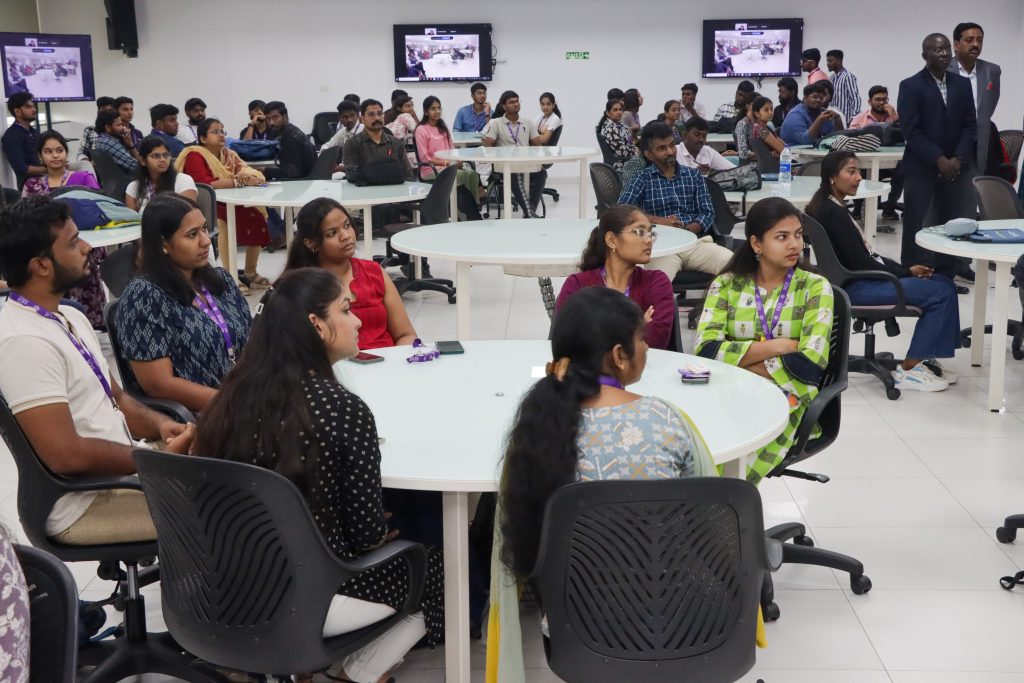
The second keynote address was delivered by Dr Syed Sadiq, a UN Women Representative from Kyrgyzstan. He commended the Paari School of Business and ICSSR for their dedication to advancing women’s rights and higher-education career opportunities. Reflecting on global progress since the first International Women’s Day in 1911, he highlighted achievements like equal voting rights, leadership opportunities, and establishing landmark treaties like the UN CEDAW (Convention on the Elimination of All Forms of Discrimination Against Women).
Despite these advancements, Dr Syed spoke about the persistent challenges women face in achieving equal pay, breaking barriers to leadership, and addressing workplace discrimination. He emphasised the need for gender-inclusive policies in higher education, targeted funding, mentorship programs, and stronger laws to combat harassment and discrimination. His “Change the Trend” and “Women Deserve More” statements were inspiring. He also discussed how systemic efforts that align with the Sustainable Development Goals (SDGs) can bring meaningful change to ensure no one is left behind.
The two-day conference also had various sessions on the barriers and biases that lead to the underrepresentation of women in leadership roles. The event concluded with a felicitation ceremony where both speakers were awarded a memento in appreciation of their remarkable sessions as keynote speakers.
- Published in Conferences, Departmental News, News, Paari Current Happenings
Lecture on Experimental Research Design by Prof. C Raghunath
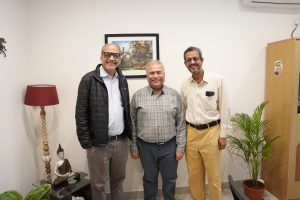 The Department of Management under the Paari School of Business organised an engaging interactive session with Faculty and PhD Scholars on Experimental Research Design. The session was addressed by Prof. Raghunath Singh Rao, Professor of Marketing at UT, University of Texas, Austin. The event provided an insightful discussion on Marketing Research where Prof. Raghunath Singh Rao shared personal insights on his research and experiments conducted in India since 2014.
The Department of Management under the Paari School of Business organised an engaging interactive session with Faculty and PhD Scholars on Experimental Research Design. The session was addressed by Prof. Raghunath Singh Rao, Professor of Marketing at UT, University of Texas, Austin. The event provided an insightful discussion on Marketing Research where Prof. Raghunath Singh Rao shared personal insights on his research and experiments conducted in India since 2014.
During the session, Prof. Rao discussed a specific experiment in the healthcare sector, highlighting the necessity of preventive healthcare in rural areas. He also presented findings from an experiment focused on the role of incentives for medical representatives and how these incentives influence their performance and sales strategies. His expertise on designing and implementing field experiments in India, offering practical insights and methodologies for conducting impactful research in the Indian context.
The outcome of the programme was two-fold. First, participants learned how to conduct in-field experiments addressing practical problems in India. Prof. Raghunath Singh Rao provided a framework for identifying relevant issues and designing experiments that can yield actionable insights. Second, attendees gained a comprehensive understanding of effectively conducting these experiments. Key points emphasised included the importance of clear objectives, selecting appropriate control and treatment groups, ensuring ethical considerations, and maintaining rigorous data collection and analysis methods. Prof. Rao also highlighted the need for adaptability in the field, considering local contexts and potential challenges. Additionally, the session covered how to conduct research through mathematical models, providing a robust approach to analysing complex data and deriving meaningful conclusions. This knowledge equips researchers with the tools to design and implement impactful field experiments, ultimately contributing to solving real-world problems in India
- Published in Departmental News, News, Paari Current Happenings
Promoting Financial Literacy with NISM
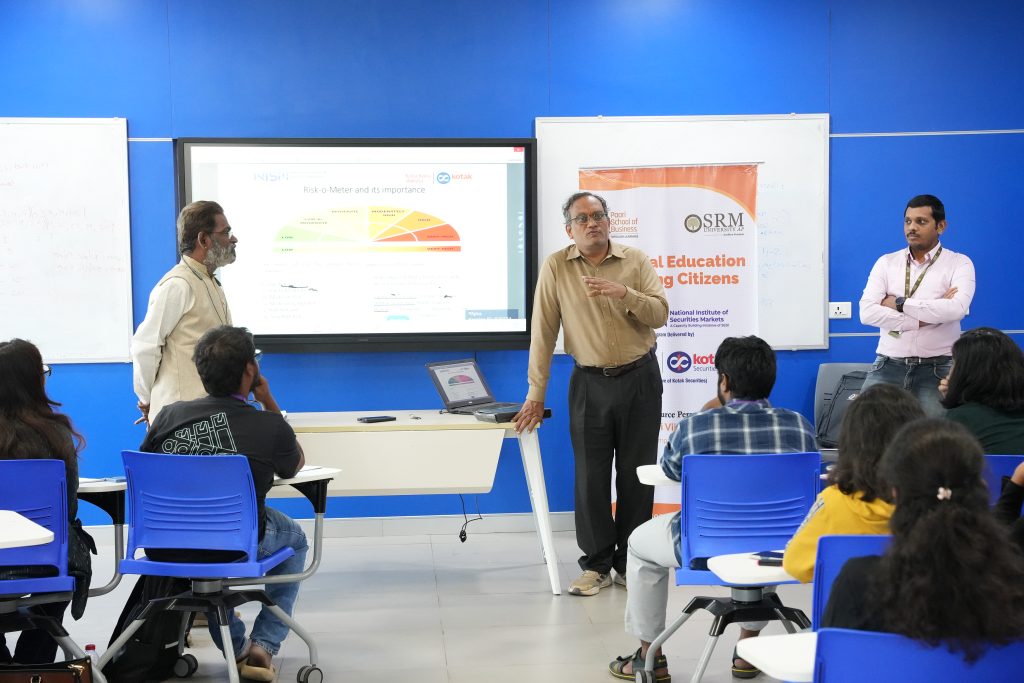
In a major initiative to promote financial literacy, the Paari School of Business organised a full-fledged Financial Education Programme under the Kona Kona Shiksha CSR Project, conducted by the National Institute of Securities Markets (NISM), on November 23 – 24 and 27 – 28, 2024. Mr Chilkuri Vijay Kumar, an NISM-empanelled resource person, conducted the programme, which saw enthusiastic participation from more than 140 MBA students.
The 10-hour programme covered, among the most important themes, career opportunities within the securities market, some investment fundamentals, primary and secondary markets, mutual funds, and various investor protection mechanisms. Besides lectures, dynamic discussions were conducted with insight into current happenings to introduce participants to the world of financial planning and investment strategies.
Mr Vijay Kumar’s interactive sessions helped students gain deeper insights into the securities market and clarified their understanding of the risks and opportunities of investment. Distributing e-certificates and comprehensive reading materials added value to the learning experience.
The session has set the stage for creating financially informed and responsible citizens. This has further reinforced Paari School of Business’s commitment to providing industry-relevant education and helping its students achieve professional excellence.
- Published in Departmental News, News, Paari Current Happenings, paari-events
A Strategic Partnership with Multi Commodity Exchange of India Ltd.
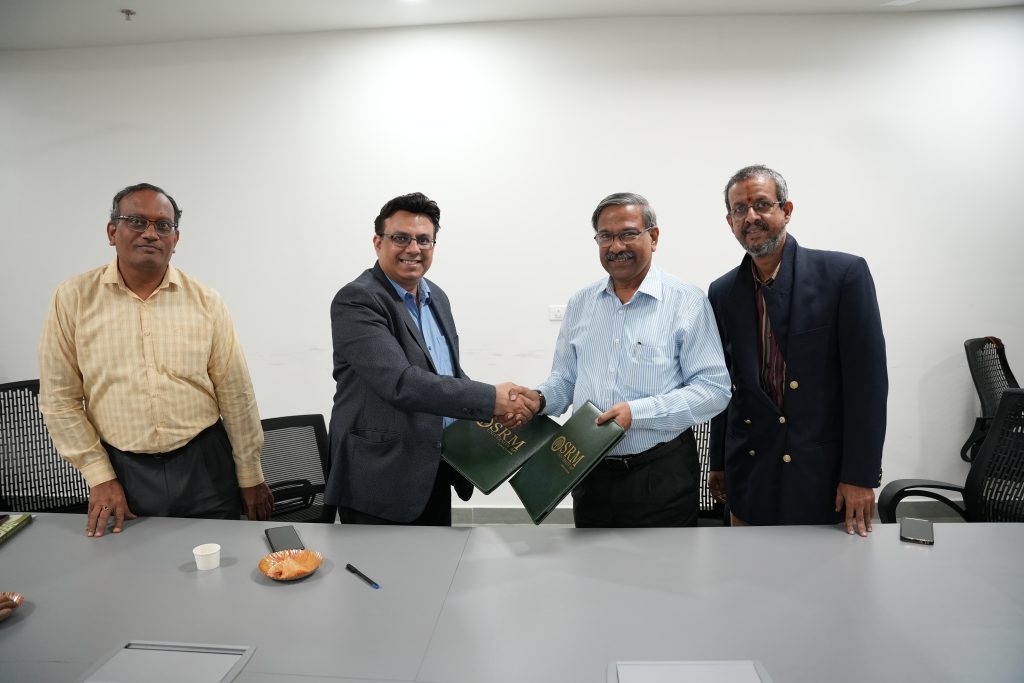
SRM University-AP inked an MoU with Multi Commodity Exchange of India Ltd. (MCX), the largest commodity exchange in the country, to supply highly skilled professionals to meet the industry’s needs. The commodity market plays a vital role in the country’s economic development. Understanding that the industry is expected to create a significant number of job opportunities in the next decade, the university has taken the initiative to partner with MCX to place highly competent graduates at various levels of the company.
The agreement will explore and conduct various interactive sessions, faculty development programmes, research programmes, seminars, conferences and conclaves that would benefit students, faculty and other working professionals. Joint Management Development Programmes (MDP) on the financial / derivatives market, educational conclaves on commodity derivatives inviting participation from other business schools & universities, and events like CONQUEST are some of the initiatives that the MOU manifests.
On the academic front, the MOU agrees that SRM University-AP may launch full/part-time Postgraduate Executive Diploma courses in the Financial /Commodity Derivatives Market with significant input from MCX on the curriculum. The university might also introduce a chapter on “Commodity Derivatives” in its curriculum for the management and commerce programmes. SRM AP will also offer existing courses of MCX, viz. MCX Commodity Professional (MCCP), MCX Certified Index Professional (MCIP) & MCX Certified Options Professional (MCOP) certification(s) as programmes or certification courses under the Paari School of Business.
The partnership with Multi Commodity Exchange of India Ltd. is of grave importance in providing the students and faculty with exposure to the industry, keeping pace with recent market trends, and acquiring an industry-ready skillset.
- Published in Departmental News, MoU, News, Paari Current Happenings
Navigating the Startup Landscape
A Tech Talk was jointly organised by the Paari School of Business and the Directorate of CR & CS. It gave budding entrepreneurs of SRM AP a comprehensive view of building and scaling startups, with practical guidance on MVP development, funding paths, and team expansion through structured hiring practices.
The Talk featuring Aravind Subash, Lead – Talent Acquisition at Increff, as the guest speaker, included engaging exercises such as conducting Extensive Research on Bootstrap Companies in India and Designing a Recruitment Flowchart, which helped students understand the various nuances of being an entrepreneur.
Mr Aravind also shared inputs on investment strategies, highlighting contributions from notable investors such as Kunal Shah (founder of CRED) and Binny Bansal (co-founder of Flipkart).
The insights shared were valuable for young students looking to start, scale, or fund a business in the dynamic startup ecosystem.
- Published in Departmental News, News, Paari Current Happenings
Industry Experts Inspire Future Leaders at the 2nd Success Mantra for Managers
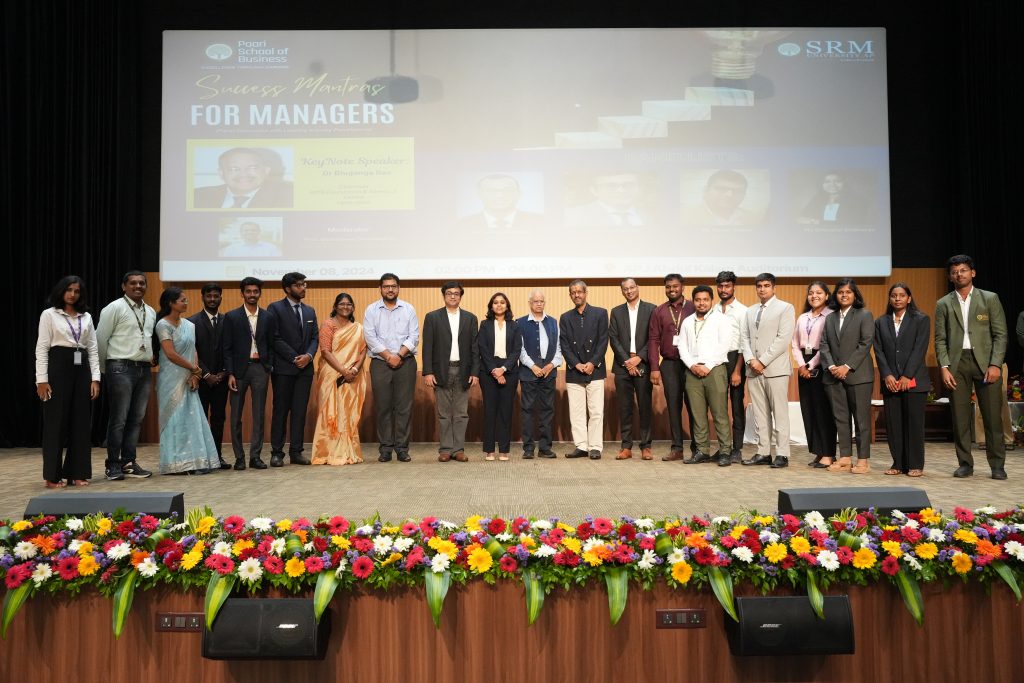
The Department of Management at the Paari School of Business conducted the second edition of its flagship event, “Success Mantra for Managers” (SMM), on November 08, 2024, uniting industry leaders to provide valuable insights, experiences, and professional guidance to students and faculty.
The event, moderated by Prof. Bharadwaj Sivakumar, Dean – Paari School of Business and Officiating Vice Chancellor, featured a distinguished panel that addressed the evolving landscape of management. Panellists shared their unique perspectives on effective leadership, motivation, and the importance of new-age skills in today’s corporate environment.
Ms Srimathi Sridharan, Director-BNY Mellon, remarked,” a manager’s role extends beyond mere target achievement; it fundamentally involves inspiring a team”. She highlighted the significance of kindness in leadership, drawing inspiration from her personal experience as well as the late industrialist and philanthropist, Mr Ratan Tata.
Mr Varun Gupta, Associate Director at PepsiCo, spoke passionately on the idea of Success. He stated, “Define Your Success, Yourself,” and stressed on the necessity for managers and leaders to possess a clear vision. He articulated how a well-defined personal and professional vision can guide managers in reaching their goals while empowering their teams.
Dr Bhujanga Rao, Chairman-KIMS Foundation & Research Centre and the key-note speaker for the discussion shared insightful reflections on his experience with Dr Abdul Kalam. He noted that compassion was a standout quality of Dr Kalam’s leadership, underlining that effective leadership encompasses understanding and supporting team members on both professional and personal levels.
Mr Suresh Ponnuru, Director-Analytics & Strategy Leader at Tiger Analytics, articulated the critical role of a leader in effectively communicating their team’s work to both superiors and clients. He highlighted the importance of perseverance and the ability to seize opportunities as they arise, which are essential traits for successful management.
Additionally, Mr Vinay Mantha, MD, Corporate & Investment Bank at J P Morgan Chase, conveyed that a manager should not only celebrate successes but also embrace failures as learning opportunities. This duality, he suggested, is fundamental to continuous growth and resilience in leadership.
In response to a question about handling success and failures at work, the panellists endorsed the significance of having an alternate plan—plan B if plan A fails. They collectively asserted that leaders must take responsibility for setbacks and implement corrective actions promptly.
The discussion further emphasised the need for managers to constantly evolve and acquire new skills, aligning with the event’s core theme that today’s managerial role must balance high performance with adaptability and empathy. Panellists shared personal anecdotes that underscored the joys and challenges of the profession.
The conversation delved into the relevance of emerging skills, such as artificial intelligence and the necessity for continuous learning, all deemed critical for future managers. Despite the focus on new-age competencies, the panellists unanimously vouched for the enduring value of traditional age-old skills like networking and ability to spot opportunities.
The event aimed at presenting the students with actionable insights and reinforced the vital importance of developing a versatile skill set in preparation for their careers, equipping them to thrive in a dynamic professional landscape.
- Published in Departmental News, News, Paari Current Happenings
Environmental Sustainability in Corporate Business Firms of Ghana
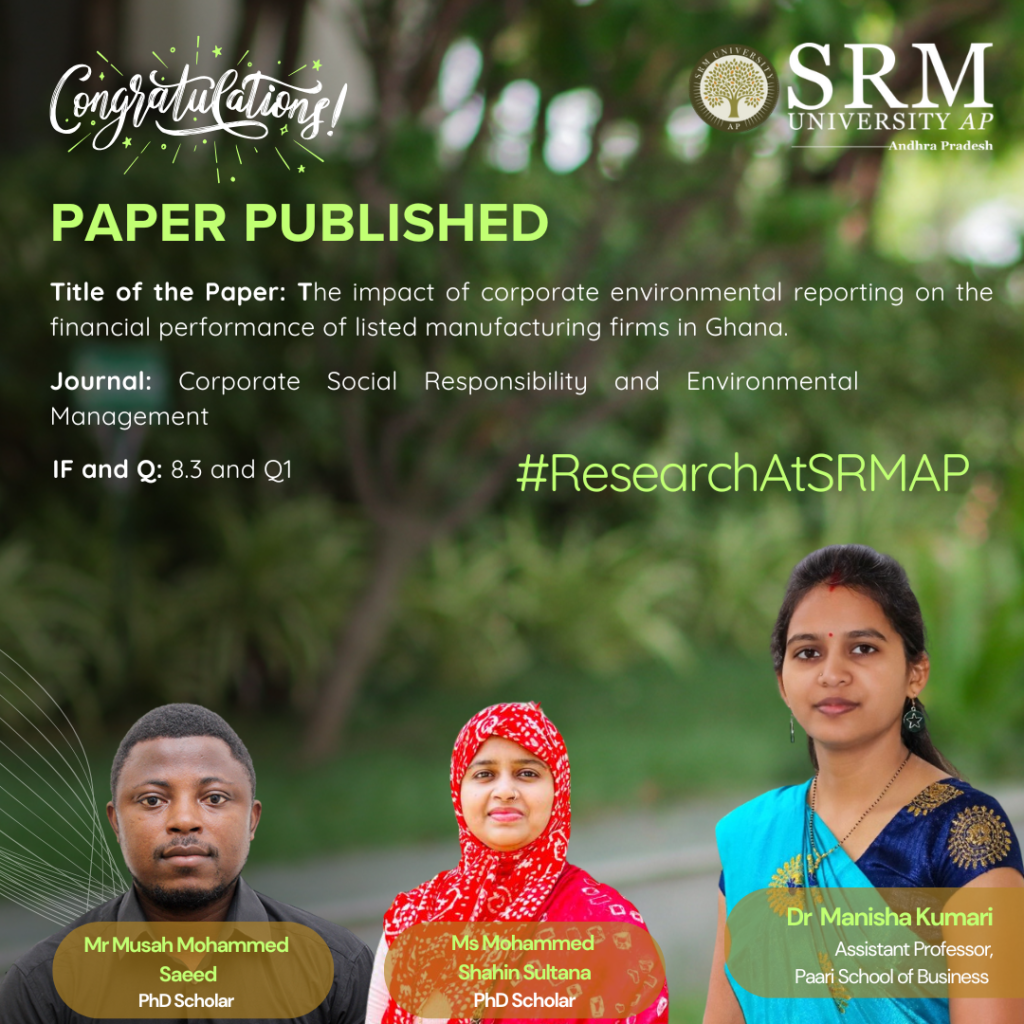
It is pivotal for multinational companies to opt for sustainable growth while expanding their domains. In this regard, Dr Manisha Kumari, Assistant Professor from the Department of Management, Paari School of Business, has published her paper titled “The Impact of Corporate Environmental Reporting on the Financial Performance of Listed Manufacturing in Ghana” along with her research scholars Mr Musah Mohammed Saeed and Ms Mohammed Shahin Sultana in the Q1 journal Corporate Social Responsibility and Environmental Management with the impact factor 8.3.
Abstract
A growing number of businesses are facing criticism for engaging in environmentally damaging practices. Despite advancements in technology and operational efficiency, the environmental challenges confronting businesses have become increasingly urgent. As disclosure requirements have expanded, the importance of reporting standards for environmental sustainability has risen. This study explores the impact of corporate environmental reporting on the financial performance of listed manufacturing firms in Ghana. It analyses ten years (2012-2021) of annual reports from 20 publicly traded manufacturing companies, using panel regression and content analysis to assess the data. The findings reveal that environmental sustainability disclosure (ENVD) has a positive and significant effect on return on equity (ROE) and net profit margin (NPM). Furthermore, disclosures related to health, safety, and community development initiatives have a strong positive impact on ROE. The study recommends that policymakers develop guidelines, especially for environmental reporting, to aid firms in preparing their annual reports. It also suggests that corporate accountants expand their expertise and collaborate with environmental and ecological experts. This research offers valuable insights for policymakers and provides a foundation for further investigation into the effects of corporate environmental reporting (CER) on the performance of listed firms in sub-Saharan Africa.
Explanation of the Research in Layperson’s Terms
In simple terms, this study looks at how companies are being criticised for harming the environment, even though they have access to better technology and more efficient ways of working. Environmental problems for businesses are getting more serious, and as governments and organisations require companies to share more information about how they affect the environment, the standards for reporting this information have become more important.
The research focuses on how reporting environmental activities affects the financial success of manufacturing companies in Ghana. It examines reports from 20 publicly traded companies over ten years (2012-2021). The analysis shows that companies that disclose their environmental efforts, such as how they manage health, safety, and community projects, tend to have better financial outcomes, particularly in terms of the profit they return to shareholders and how much profit they make overall.
The study recommends that governments create clear guidelines for environmental reporting to help companies include this information in their annual reports. It also suggests that accountants should work more closely with environmental experts to improve their knowledge. The research provides important information for policymakers and encourages further exploration into how reporting on environmental activities affects company performance in Africa.
Practical Implementation/Social Implications of the Research
The study shows that environmental sustainability disclosures (ENVD) positively impact net profit margin (NPM) and return on equity (ROE) but have minimal effect on return on assets (ROA). This emphasises the need for stricter regulations to ensure comprehensive sustainability reporting, with policymakers incentivising better practices to boost financial performance.
- Energy disclosure (END) positively affects NPM, ROA, and ROE, suggesting mandatory energy-efficiency reporting. Regulators should set standardised metrics and offer tax incentives to encourage energy-efficient technologies.
- Mandatory environmental reporting by companies can help achieve environmental goals, gain importance in securing trade partnerships, and attract global capital.
- Health and safety disclosures (HSD) improve financial metrics, underscoring the need for stricter workplace safety regulations and rewarding safety-focused companies to enhance both worker safety and financial outcomes.
- Community involvement disclosure (CID), which has a negative but insignificant effect on financial performance, highlights the need for standardised reporting and alignment with core business strategies to show long-term value.
- To boost transparency, integrated reporting should be adopted nationwide, embedding environmental and social disclosures into financial reports to better demonstrate their long-term impact. Strengthening Ghana’s weak regulatory framework and aligning it with international standards (e.g., IFRS S1 and S2) would improve corporate social responsibility (CSR) practices, particularly in community development.
- Fiscal incentives, such as tax breaks, could encourage firms to invest in long-term sustainability projects, such as education and healthcare. Capacity building within firms, including sustainability training, would improve both financial and environmental outcomes.
- Standard method of accounting for environmental reporting can bring consistency in the market. Also, they required a proper set of guidelines that can attract environmental investors.
Overall, policy reforms focused on transparency, regulation, and aligning sustainability with financial goals would significantly benefit Ghana’s corporate sector.
Future Research Plans
Dr Manisha plans to shift her focus from traditional accounting standards to the growing field of sustainability reporting. This transition aligns with the increasing global emphasis on environmental, social, and governance (ESG) issues, which have become central to corporate accountability and transparency. Sustainability reporting has been a topic of ongoing discussion, reflecting the need for businesses to disclose not only their financial performance but also their impact on the planet and society.
- Published in Departmental News, News, Paari Current Happenings, Research News
Marketing Wizard Delivers Lecture on D2C Marketing
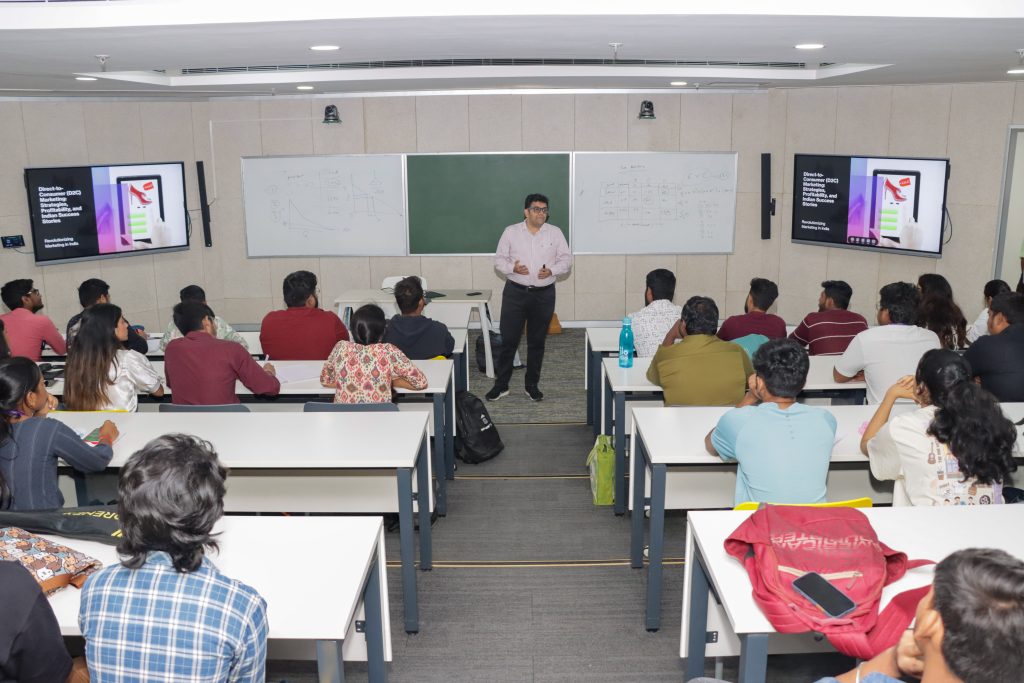 The students of Paari School of Business (PSB) had a memorable experience when Mr Siddesh Joglekar joined as a guest lecturer at SRM University-AP. The CRCS team’s dedicated efforts and the unwavering support of Prof. Bharadwaj Sivakumaran, Dean of PSB, made this unique opportunity possible. Students had the privilege of engaging in a personal interaction with the esteemed guest on September 18, 2024.
The students of Paari School of Business (PSB) had a memorable experience when Mr Siddesh Joglekar joined as a guest lecturer at SRM University-AP. The CRCS team’s dedicated efforts and the unwavering support of Prof. Bharadwaj Sivakumaran, Dean of PSB, made this unique opportunity possible. Students had the privilege of engaging in a personal interaction with the esteemed guest on September 18, 2024.
During the lecture Mr Joglekar shed light on various aspects of professional growth and marketing strategies. He placed significant emphasis on the need to foster a collaborative environment and recognising the contributions of peers.The lecture also delved into the imporatance of networking for career advancement, especially through ones’ Alumni Associations
Mr Joglekar delved into the expansive potential of Direct to Consumer (D2C) marketing, using examples from renowned companies like Twitter, Walmart, Instagram, Zomato, Amazon, Tesla, and Google to illustrate the evolution of brand images. A poignant quote from Mr Joglekar, “Companies are transformed into brands by people who dare to dream,” encapsulated the essence of the discussion, emphasising the role of visionary individuals in shaping successful brands.
Interactive elements were woven into the session, including an activity where students were tasked with creating logos that branded themselves, thus reflecting a unique aspect of their identity. This hands-on approach not only made the learning process engaging but also provided practical insights into branding.
A comparative analysis between traditional retail and D2C highlighted key differences such as distribution channels, pricing strategies, and brand control, offering a deeper understanding of the contemporary marketing landscape. The concepts of Customer Acquisition Cost (CAC) and Life-Time Value (LTV) were also explored, underscoring their importance in building a strong brand identity.
As the session neared its conclusion, Mr Joglekar introduced an innovative activity that involved reverse engineering an advertisement concept, inspired by the 2022 ad campaign featuring Mr Neeraj Chopra for Cred. This exercise prompted students to think creatively and apply the concepts discussed in a practical context.
The session wrapped up with a Q&A segment, where discussions ranged from market profitability to the advantages of D2C marketing, allowing for a comprehensive review of the topics covered. Ms Andrea Benedict extended a vote of thanks on behalf of the student fraternity of PSB, culminating in a group photo session that captured the essence of the enriching experience.
- Published in Departmental News, News, Paari Current Happenings, paari-guest-lectures
Leadership Insights: Navigating the Future with Paari School of Business
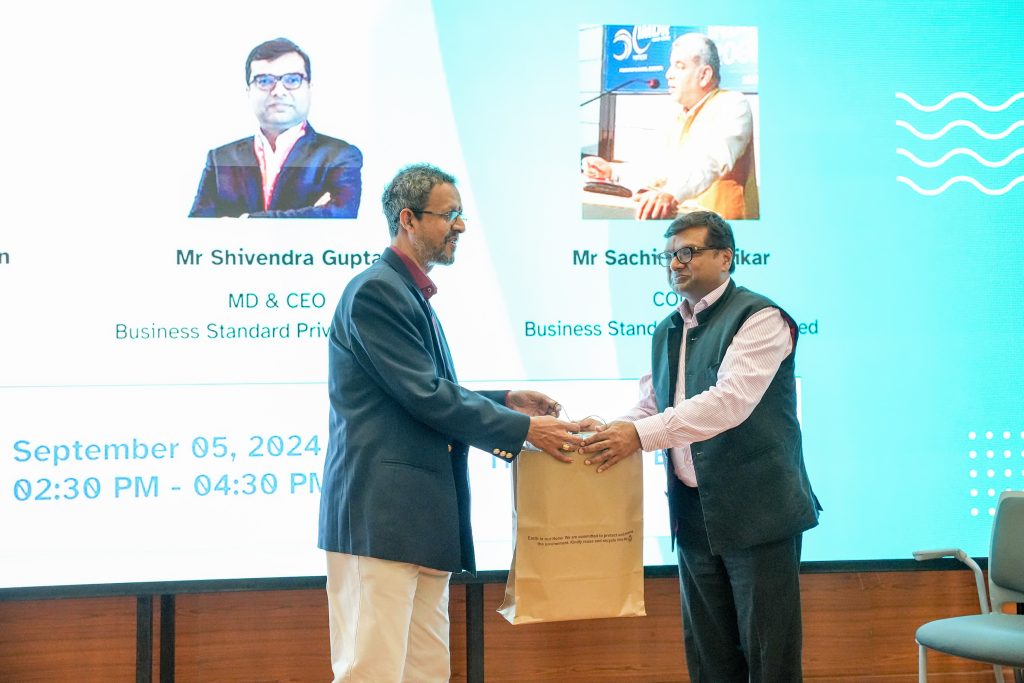 Paari School of Business’s “Insights and Perspectives” initiative featured an interactive discussion with three domain experts: Prof. Bharadhwaj Sivakumaran, Dean of PSB; Mr Shivendra Gupta, MD & CEO of Business Standard Private Ltd; and Mr Sachin Phaniskar, Chief Operating Officer of Business Standard Private Ltd, engaging with luminaries.
Paari School of Business’s “Insights and Perspectives” initiative featured an interactive discussion with three domain experts: Prof. Bharadhwaj Sivakumaran, Dean of PSB; Mr Shivendra Gupta, MD & CEO of Business Standard Private Ltd; and Mr Sachin Phaniskar, Chief Operating Officer of Business Standard Private Ltd, engaging with luminaries.
The event aimed to offer practical leadership guidance and valuable insights for professional development from experienced personnel in the academic and corporate sectors. The initiative facilitated discussions with prominent figures to emphasise the importance of improving decision-making skills, interpersonal abilities, and technological proficiency. Participants were urged to seize opportunities for growth, leverage their strengths, work on areas needing improvement, and adopt a forward-thinking mindset. Additionally, the conversation highlighted key leadership principles, including effective delegation, creating a lasting impact, and turning challenges into strategic advantages.
Participants were also encouraged to focus on long-term goals, experience the complete lifecycle of projects, and understand the value of delegation and legacy-building in leadership. The conversation highlighted key themes such as turning challenges into opportunities, understanding the difference between ideation and business execution, and the importance of humility in achieving success. Overall, the event provided attendees with practical takeaways to apply in their leadership journey and a deeper understanding of the evolving demands in today’s business landscape.
- Published in Departmental News, News, Paari Current Happenings


